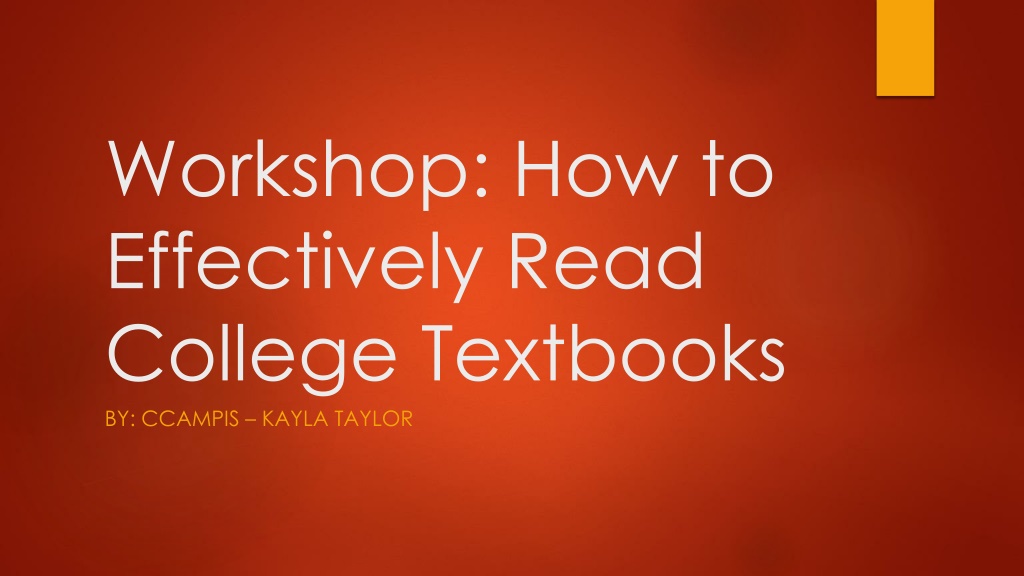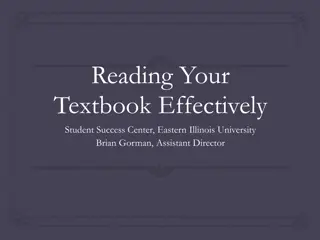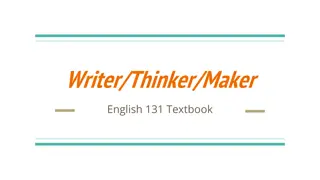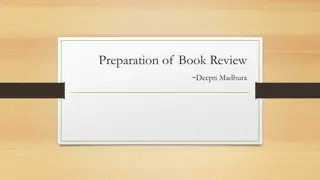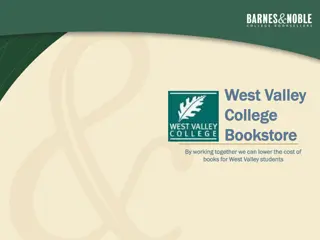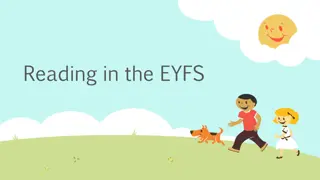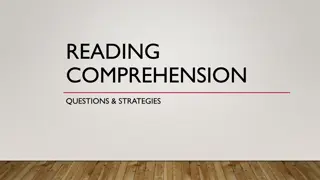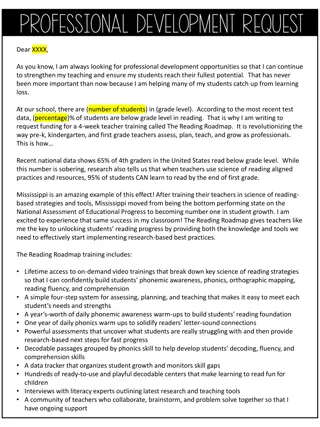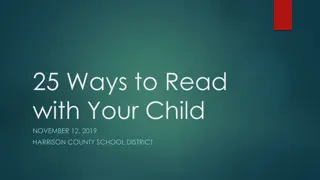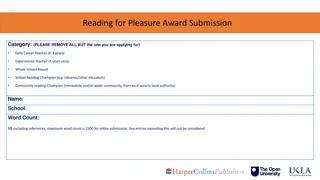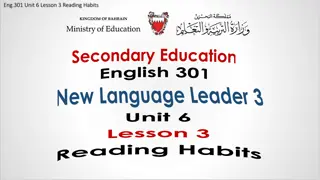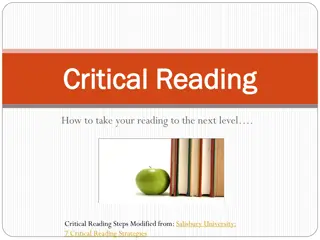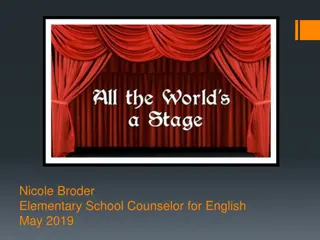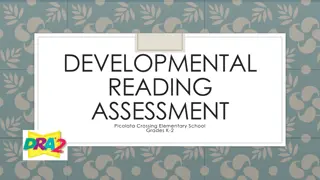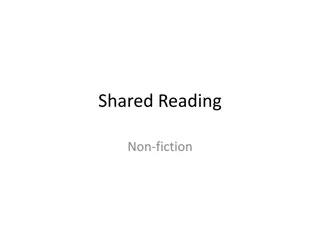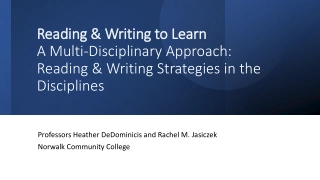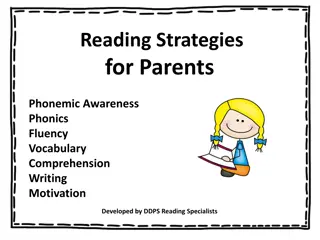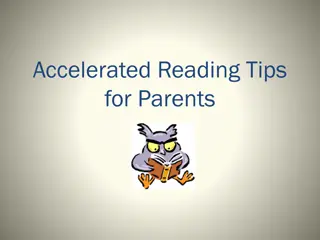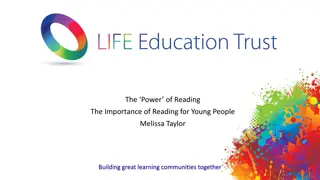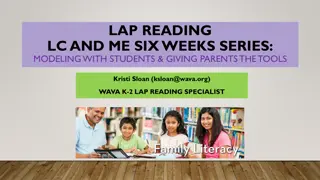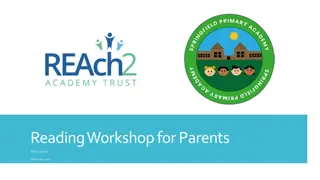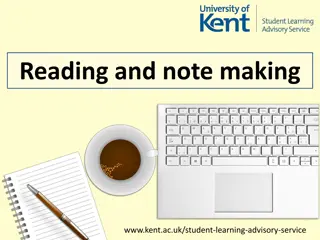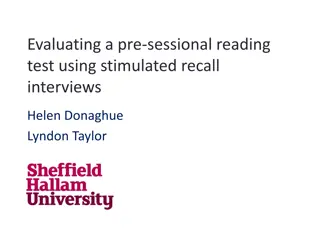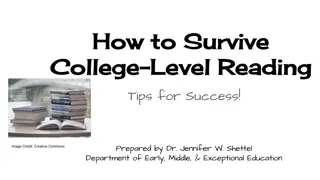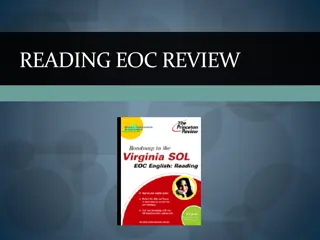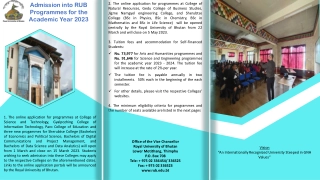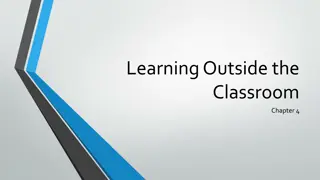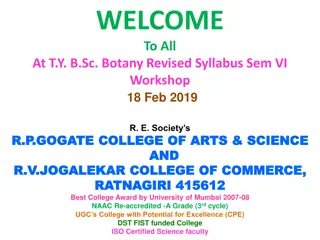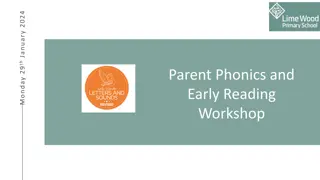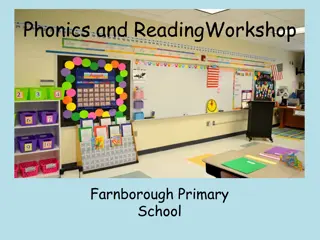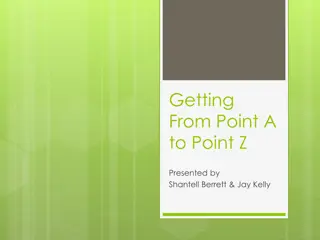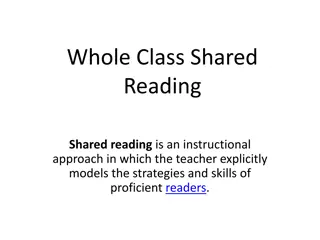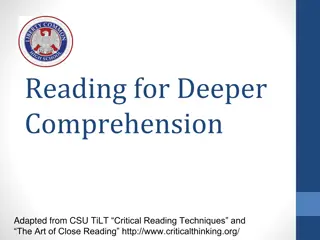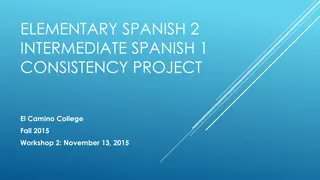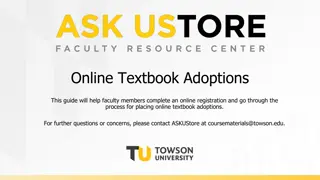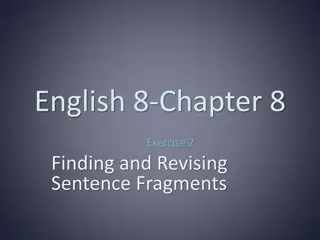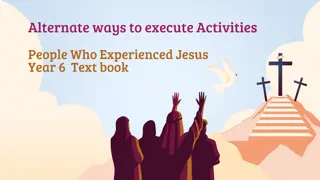College Textbook Reading Strategies Workshop
Learn effective strategies for reading college textbooks, including pre-reading techniques, chunking content, setting study routines, and active reading methods. Enhance your comprehension, retention, and overall learning experience with practical tips and guidance provided in this workshop by Kayla Taylor.
Download Presentation

Please find below an Image/Link to download the presentation.
The content on the website is provided AS IS for your information and personal use only. It may not be sold, licensed, or shared on other websites without obtaining consent from the author. Download presentation by click this link. If you encounter any issues during the download, it is possible that the publisher has removed the file from their server.
E N D
Presentation Transcript
Workshop: How to Effectively Read College Textbooks BY: CCAMPIS KAYLA TAYLOR
Title: How to Effectively Read College Textbooks Length: 1 Hour Supplies Needed: pencil, paper, college textbook
Topics Covered: How to read a textbook How long to read a textbook How to break up long chapters into easier reading How to create questions from your reading for better comprehension How to properly highlight information in your textbook When to review information
How Do You Read a College Textbook? Like most things in life, reading is something we all do whether passively or actively. However, unlike reading your favorite book before bed, the college textbook is a separate beast all on its own and requires different methods of reading and comprehension. College textbooks are designed to be a bastion of information and a wealth of knowledge, meaning they cram a lot of information is not so a lot of pages. To get the most out of these pages, you need to have a game plan ready before you open that book.
Tip #1: Reading the Chapter Before the Lecture Ask nearly any professor and they will say they expect the student to have the material read before the day in class. And it s true! By reading the chapter beforehand, it gives you a leg up on the lecture and instead of learning for the first time, you re reinforcing knowledge already there, making it much more efficient learning!
Tip #2: Divide the Chapter Into Readable Chunks A 50 page chapter is groan (and maybe even some panic) inducing. Instead, think of it as five sections of 10 pages a piece, taking a break between each section. This way you don t overextend yourself trying to read too much information at once. Your brain will probably check out by page 25 if you try and read it all at once and you ll only be spinning your wheels trying to absorb something your brain has already declined an interest in.
Tip #3 Most people say, Well, I ll study after dinner or I ll study after this last episode of Stranger Things . However, because they did not actually set a game-plan to actually study, a lot of them won t do it and will just push it off. It s a lot harder to say No to yourself when you already have a location, time, and material ready to go. Say to yourself, I ll study at my kitchen table at 7:30PM and I will be covering English Composition II . Be resolute in your plans!
Tip #4: Preview Your Chapters Read the title, introduction, headings, preview the images and graphs, and read the chapter summary before you venture into the actual chapter. This will give you an idea of what you are about to cover and when you go over the material in the chapter, you ll be reinforcing ideas into your brain instead of learning them for the first time!
Tip #5: Turn Chapter Headings Into Questions Take for example a history book, you are reading a chapter on the Civil War and the heading it titled Causes of the Civil War . Instead, think of it as What are the causes of the Civil War? By giving yourself a purpose during reading, you ll be much more focused and ready to point out important material.
Tip #6, Marking the Text Highlighting can be a key feature in any used text book. It s even more useful when you re the one highlighting! I recommend a three color system for any highlighter user. Yellow equals the main point of a paragraph or chapter. Orange (Green in this case) equals an important supporting detail related to the main point. Pink equals a vocal word. Now, this is a bit much for one paragraph but the sentiment is the same. Use different colors for different aspects that you need to learn.
Tip # 7: Taking Notes As You Read/After Highlighting Taking notes after you read a section is a good habit to get into, especially after highlighting. Going through and using your preferred method of note taking (Cornell, Outline, or Brain-Mapping), take down all the important bits of information which you believe you ll need to learn for your exam. This is especially easy after you ve highlighted all the relevant sections
Tip #8: Monitoring Your Comprehension Stop to check your understanding of the material you are reading at regular intervals such as the end of a chapter or at the end of every three sections. Check your understanding by summarizing what you have learned so far
Tip #9: Review Immediately What You Read After you complete your reading assignment, take five to ten minutes (or more) to review what you have just read before forgetting takes place. Develop a recall column or summarize the key information. This would also be a good time to start putting everything into notes and converting what you just learned into long-term memory.
Tip #10: Prompt Your Memory Use the headings of your textbook or your notes to prompt your memory. Recite the information out loud or write it down. This will help transfer the information into long-term memory.
Questions/Comments/Concerns? Does anyone have any questions, comments, or concerns? Some tips they want to share?
Discussion How do you plan on changing your study habits after this workshop? How many of these tips were you already doing? Do you feel like these tips will help you better understand your textbooks?
